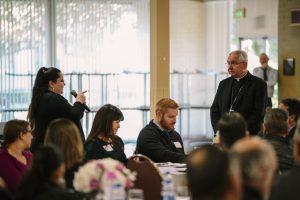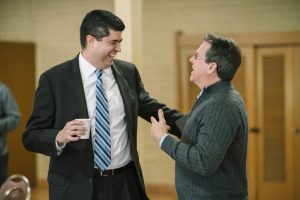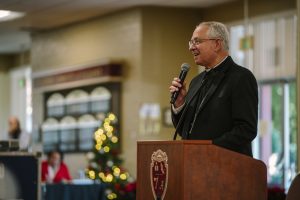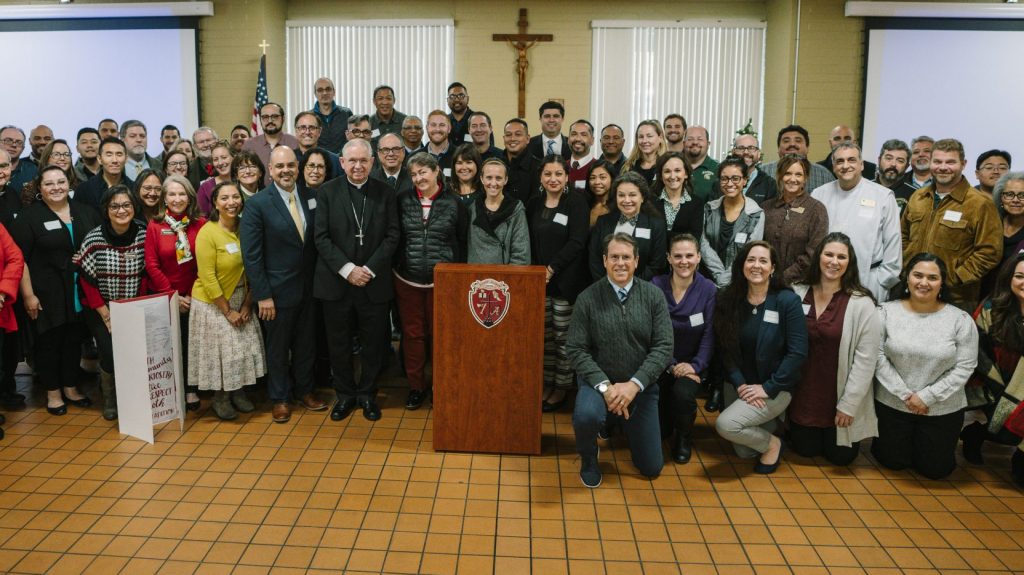Each day in the life of a high school theology teacher or campus minister in the Archdiocese of Los Angeles (ADLA) comes with its own set of challenges.
How to connect with students who aren’t necessarily pushing back against the Catholic faith, but appear to be more indifferent about it? When and where are the greatest opportunities to evangelize, and how do you use them to create teachable moments? What are the most productive ways to explain what’s happening with world events as they relate to our personal beliefs?
Archbishop José H. Gomez heard that kind of “catechized questioning” when he met with 75 Catholics at Bishop Alemany High School in Mission Hills. They and their principals were invited by the Department of Catholic Schools (DCS) to a third annual event that unites prayer with an open dialogue about best practices and intended results.

After a morning of breakfast, adoration of the Blessed Sacrament in the school chapel and a Mass celebrated by Archbishop Gomez, the group moved into the school’s Alumni Hall. They heard Archbishop Gomez reinforce his commitment to education, evangelization, and a relationship with the holy Eucharist as no different than when he arrived in Los Angeles 10 years ago.
“My hope is to have schools open, vibrant, and with a real solid Catholic identity,” he said. “What can we do to achieve the goal of making every single young man and woman be a disciple of Jesus Christ?
“From the outside looking in, to me it seems students have a hard time relating to spiritual things. It seems they want immediate responses to everything. Is that appropriate? Does that make sense?”
Many in the room nodded their heads in agreement.
Paul Escala, who last August began as senior director and superintendent of schools, also addressed the group, noting that as a product of ADLA Catholic education himself, “I come at a moment when we are challenged greatly by the dynamics playing out in our regions, and all of you amplify those challenges and recognize the changing dynamics of our young people today.”

He then held up his cellphone as an example of where that change is happening.
“This is where children are at,” he said. “The anonymity they are able to create in the world of digital and social media creates a firewall — no pun intended — between that and the real world. We’re challenged to help penetrate that firewall and help those children find the relevancy and power of Christ. All of you ministers every day are meeting that challenge and can be humbled by it.”
Among the topics raised in the 45-minute session were curriculum conformity, immigration, and “Dreamers,” inclusive messaging, creating opportunities for social justice projects as entry points, and the value of apologetics courses to give students the tools to defend their Faith at an intellectual level.
Billy Gillespie, a theology teacher at St. Monica High School in Santa Monica, emphasized to the gathering that the most powerful way to connect with students is to testify with their personal faith experience.
“I’m one of those kids that once left the Church because I didn’t believe, and I had an encounter with the Holy Spirit that left no doubt of God,” Gillespie said. “We have to share our stories over and over again with our children. If we’re there with them almost every day, that influence will hopefully push through the shell of the secular world and allow them to know the truth of our beautiful faith.”
Christopher De Vera, a campus minister of theology and Catholic Life Communities youth ministry adviser at Bishop Amat High School in La Puente, explained how schools like his not connected to a parish could achieve results similar to those who are by focusing on how the power of the sacraments of the Eucharist and confession can be taken with students no matter where else they journey in their lives.
“It’s great to know you’re not alone and other schools face many of the same things,” De Vera said about his takeaway from the event. “This reaffirms what we need to do. It’s a matter of us all working together to make it one, true, holy, Catholic and apostolic Church.”
Marco Roman, Ph.D., DCS’s director of Religious Instruction and Faith Formation for High Schools, said this was also imperative to highlight and appreciate those who help shape faith formation on the 51 campuses.
“They want to know they’re being supported and their work is important, and objectively it is,” said Roman. “It’s good to have the chief teacher here, leading us in prayer, and hearing questions that are a reflection of what is being asked by many in the Church today. Our religion teachers are on the front lines of evangelization.
“It can feel overwhelming at times because of the sheer size of this archdiocese. But I think we are on the same page with encouragement, mission, and everything that is important to us all.”
Gomez ended the Q&A with a message of gratitude and unity.

“I want to thank all of you for what you do for Catholic schools. Let’s keep working together. It’s essential for the future of the Church. It doesn’t matter if you’re here or there, we are together and it’s important we learn from each other and see that we are united to bring the beauty of the life of our Lord Jesus Christ to our students.”

